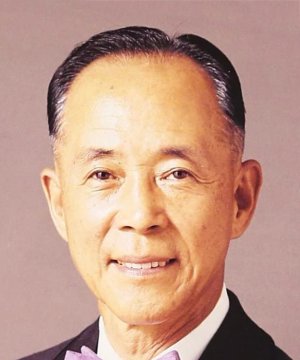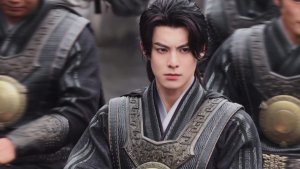Fujiyama Ichiro
- Name: Fujiyama Ichiro
- Native name: 藤山一郎
- Also Known as: Fujiyama Ichirou, ふじやま いちろう, ますなが たけお, 増永丈夫
- Nationality: Japanese
- Gender: Male
- Born: April 8, 1911
- Died: August 21, 1993
He was active as a tenor national singer and popular singer with the orthodox vocal technique, singing method, anf music theory cultivated at Tokyo Music School, as well as the voice of high baritone. From the 1930s to the 1940s, he released numerous hits such as "Sake wa Namida ka Tameiki ka", "Oka o Koete", "Tokyo Rhapsody", "Aoi Sanmyku", and "Nagasaki no Kane".
The government, which launched the National Spiritual Mobilization in the wake of the Marco Polo Bridge Incident in 1937, encouraged the music industry to release songs that would raise the spirit of war, with the theme of humor, love, and sentiment. According to this policy, Fujiyama has released songs such as "Yamauchi Chui no Haha".
On August 15, 1945, Fujiyama learned of Japan's defeat in a car traveling from Surabaya, Java to Madiun. He was taken as a prisoner of the Republic of Indonesia, which had just declared independence, and was detained in a prison in Naui, central Java, and then transferred to a prison in Magetan in the middle Solo River. In 1946, he moved to a mountain village in Pujon, Malang, at the behest of Sukarno. There was a farm run by the Mitsubishi Zaibatsu, and the soldiers of the former Imperial Japanese Navy named the area "Kurama Village" and lived a self-sufficient life. On July 15, 1946, Fujiyama returned to Japan on the aircraft carrier Katsuragi, which was converted into a return transport ship.
In October 1972, with the death of the first chairman, Shoji Taro, he became chairman of the Japanese Singers Association. The association was a voluntary organization that sought to strengthen the position of singers, but it was discussed that it would become an incorporated association when Fujiyama became chairman. As a result of negotiations with the Agency for Cultural Affairs, the association was approved as an incorporated association in May 1975. Fujiyama served as chairman until May 1979, after which he served as a director.
On May 28, 1992, Fujiyama received the National Honor Award, being the first non-athlete to win the award during his lifetime. The reasons for the award were "with proper music technology and intellectual interpretation, he pioneered a unique frontier in the singing of songs", and "for a long time, he gave hope and encouragement to the people through songs".
In addition to the National Honor Award, Fujiyama also received the Order of the Sacred Treasure in Spring 1982, the Medal with Purple Ribbon in 1973, the Special Merit Award of the Japanese Red Cross Society in 1952, the NHK Broadcasting Culture Award in 1958, the Medal with Social Education in 1959, and the Japan Record Awards Special Award in 1974.
Fujiyama died on August 21, 1993, due to acute heart failure. His last media appearance was "Dai 25-kai Omoide no Melody", which was broadcasted on NHK General TV on August 14th of the same year.
Fujiyama's relics were donated to NHK by the bereaved family and are exhibited in the "Ichiro Fujiyama Composition Room" of the NHK Museum of Broadcasting. In addition to NHK, the bereaved family also donated relics to Yono City for singing the city song "Yonoshi Tamika" in Yono City, Saitama Prefecture. Edit Biography
Movie
| Title | Rating |
|---|---|
|
Utau Maboroshi Goten
Japanese Movie, 1949,
Cowboy Pink Row
(Support Role)
|
0.0
|
|
Dassen Jonetsu Musume
Japanese Movie, 1949,
[Cowboy]
(Bit part)
|
0.0
|
|
Bikkuri Go Ri Otoko
Japanese Movie, 1949,
(Support Role)
|
0.0
|
|
Utau Enoken Torimonocho
Japanese Movie, 1948,
Sukeju
(Support Role)
|
0.0
|
|
Tokyo Rhapsody
Japanese Movie, 1936,
Wakahara Ichiro
(Main Role)
|
6.0
|
TV Show
| Title | Rating |
|---|---|
|
Kouhaku Uta Gassen
Japanese TV Show, 1951, 75 eps
(Ep. 1-8, 15, 24, 30) | [Supporter] (Ep. 40, 42-43)
(Guest)
|
7.6
|
Trending Articles
Former BIGBANG's T.O.P will not attend the interview for 'Squid Game Season 2'
News - Dec 20, 2024
Former BIGBANG's T.O.P will not participate in Netflix's interview for Squid Game Season 2.
Jang Na Ra, Park Shin Hye, Ahn Bo Hyun, and more win at the SBS Drama Awards 2024
News - Dec 22, 2024
Check out the full list of SBS Drama Awards 2024 winners
'When the Phone Rings' takes Netflix by storm, scores new personal-best ratings
News - Dec 15, 2024
Check out the latest domestic ratings and rankings of weekend K-dramas When the Phone Rings, The Fiery Priest Season 2, and Love Your Enemy
Actress Han So Hee and BIGBANG's G-Dragon are reportedly in a relationship
News - Dec 20, 2024
Han So Hee is swept up in another dating news.
Dylan Wang's 'Guardians of the Dafeng' announces premiere date
News - Dec 20, 2024
The much-anticipated Chinese fantasy drama is finally here!
Park Shin Hye, Ahn Bo Hyun, Ji Sung and more nominated for SBS Drama Awards 2024's Grand Prize
News - Dec 18, 2024
Check out the full list of Grand Prize nominees for the SBS Drama Awards 2024
Song Hye Kyo and Jeon Yeo Been are all praise for each other at 'Dark Nuns's press conference
News - Dec 16, 2024
Also check out the latest teaser from the upcoming horror K-movie Dark Nuns
'When the Phone Rings' goes steady, 'Family Matters' breaks records
News - Dec 21, 2024
Checkout the ratings and rankings of Friday K-dramas When the Phone Rings, The Fiery Priest Season 2, and Family Matters
















